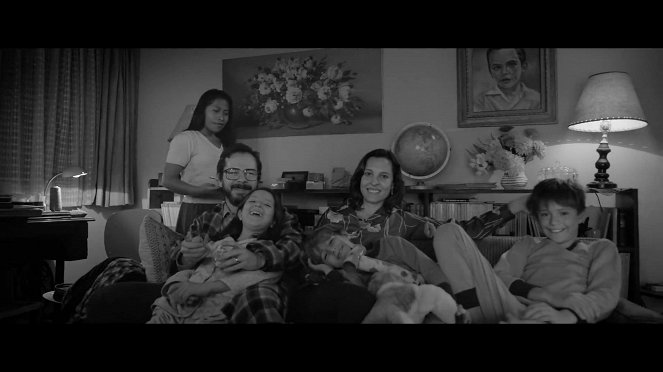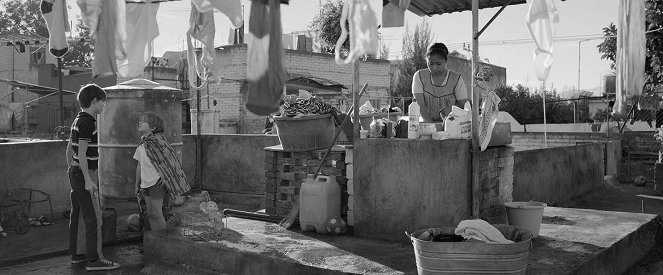Directed by:
Alfonso CuarónScreenplay:
Alfonso CuarónCinematography:
Alfonso CuarónCast:
Yalitza Aparicio, Marina de Tavira, Diego Cortina Autrey, Carlos Peralta, Marco Graf, Daniela Demesa, Nancy García García, Verónica García, Andy Cortés (more)VOD (1)
Plots(1)
Cleo (Yalitza Aparicio) is a young domestic worker that works for a family in the upper middle class colonia Roma, Mexico City. In this love letter writen to the women that raised him, Cuarón took inspiration from his own childhood to paint a realistic and moving portrait of the domestic conflicts and social hierarchies that sorrounded the political climate of the 1970's. (Interior XIII)
(more)Videos (1)
Reviews (13)
Roma isn’t love at first sight, it’s not a film that would hook me in the first minutes keep me hooked all the way till the end. But, after two or three days, it did grow on me. Cuarón this time delivers a detached view into a couple of months of the life of a broken Mexican family, mainly that of their maid, Cleo. The story takes place in a sort of by the way manner, with the camera following relative “non-stories”. But each of those fragments compose a surprisingly rich mosaic of human destinies and by the end the viewer must acknowledge that a lot has actually happened. The similarities with Czech films that in the microcosm of one family tell wider stories with a universal reach are not entirely out of place. Watching it in the cinema is certainly worth it, the camera work and, in particular, the sound are top-notch. One of the films of the year. #svetozorcinema
()
A normal viewer who seeks spectacle and entertainment while watching movies will most likely be unimpressed by Roma. However, I think that for festivalgoers and a club audience, the film will represent the embodiment of what an artistic film should be. It was filmed in a similar manner as in the 60s and 70s when authorial and autobiographical works were in their prime and enlightened producers invested in them without hesitation. It was a time when directors commonly cast non-actors, and Cuarón does the same here. He is not afraid of improvisation, and the same goes for the Mexican directorial star. Roma feels genuine and authentic. Granted, I am not an expert, but the atmosphere of Mexico City in the early 70s seems perfect to me, as well as the casting. Cuarón must have paid maximum attention to the casting, and Yalitza Aparicio does not play the role of a servant, she simply is one. Devoted, resigned to her position, slightly naive, intoxicated by her first sexual adventure, and confused by the subsequent indifference. Her presence and precise camera work are the director's greatest weapons. The black and white visuals refer to the era of European art film of the 50s and 60s. In many shots, it felt as if I was watching a documentary from that time in the Mexican capital. Thanks to the monumental visual compositions, Roma should be seen on a big screen, which I managed to do after a long search. I would even dare to say that it loses a significant amount of impact on a small screen. It is a slowly flowing intimate film that, although not feminist in nature, mostly depicts the world and emotions of women. Overall impression: 85%.
()
A singular expression of emotion primarily through the camera, instead of dialogue and music. A unique directorial achievement in uncompromising black and white, non-mainstream, with overlong camera shots and some brilliantly staged sequences (the birth). An ode to art filmmaking and a myriad of technical finesse, but, save a few exceptions, you won't hear a single full-blooded heartbeat.
()
I feel like I have to like Roma if I want to consider myself a film connoisseur. I'm not even close to being one. I'm just a casual viewer. I watch movies that I assume I might enjoy, or ones I want to see if I might happen to enjoy. This movie was in the latter group. I found the answer. I didn't much enjoy Roma. It was too "artsy" and lethargic for me. What I can't deny this film, however, is the atmosphere and the interesting cinematography. The film certainly has other bonuses, but unfortunately I can't appreciate them properly, at least not yet.
()
The surreal power of this film, I think, stems from three things. The first is actually a very ordinary story of a completely awkward main protagonist, which is almost documentary-authentic, personal and 100% impressive thanks to the ordinariness and the awkwardness. The second thing is, without exaggeration, the masterful direction of Alfonso Cuarón. That really needs to be seen. You could create the perfect art photograph from perhaps every shot, it's all thought out to the smallest detail and the black and white camera with the hearty help of sound (something we can't see at all, just we hear it) makes it a feast for the eyes (for example the monumental forest fire scene). The third thing is how the story and presentation “work together" - everything is natural, long camera rides or still shots do not distract from what's happening right now, the scenes beautifully complement each other, form a single whole, etc. I was originally expecting something from Roma in the style of Tornatore’s Malena. It's a completely different film though, completely great in a different way. And the scenes in the maternity ward or on the beach... You simply do not forget them.
()



Ads